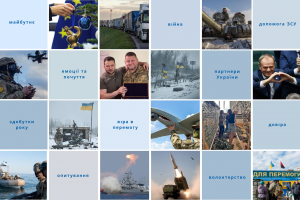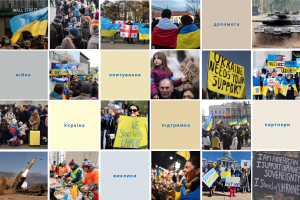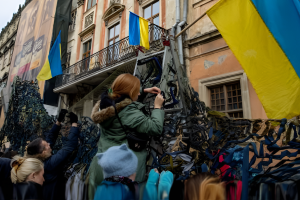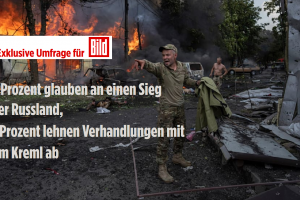Household matters and interests motivate most Ukrainians to engage in civic life

The results of the 2017 USAID/ENGAGE Civic Engagement Poll reports intensive civic engagement and activism of Ukrainian citizens. In 2017 citizens of Ukraine are actively participating in civil society initiatives, but look mostly at those that directly address their needs and interests. Every second Ukrainian is aware of and every forth approve of civil society organizations and initiatives. However, one-third of the survey respondents could not name any single civil society organization or initiative.
The USAID/ENGAGE National Civic Engagement Poll is commissioned by Pact in the framework of the Enhance Non-Governmental Actors and Grassroots Engagement activity of USAID, implemented by Pact . The survey concentrates on gauging citizen engagement of and participation in, and public attitudes towards civil society organizations, as well as citizens’ participation and perception of reform processes in Ukraine. In addition, the poll measures the rate of civic literacy and shifts in Ukrainians values and beliefs. Pact conducts three waves of the survey three times per year to trace short and mid-term trends in citizen engagement in and awareness of civil society activities. The current wave was conducted by GfK Ukraine in August-September 2017.
Field interviews were conducted with residents of Ukraine aged 18 years and older, face-to-face at respondents’ homes. The size of the sample is 2,134 respondents and its design corresponds to the distribution of adult population of Ukraine by age, sex, oblast and settlement type (excluding AR Crimea and those areas in Donetsk and Luhansk oblasts that are not presently controlled by the government.) The margin of error of the sample is 2.2% (excluding the design effect.) For comparison reasons, results of similar surveys that were conducted by Pact under the USAID/UNITER project are shown along with the current results.
According to the poll, Ukrainians are dissatisfied with the progress on reforms. Moreover, a quarter of the respondents experienced negative consequences to date. Economic hardships, the conflict in Donbas and corruption tops Ukrainians’ reform agenda. Most Ukrainians do not see any improvement in battling corruption.
Ukrainians surveyed by Pact demonstrated eagerness to learn to defend their human rights, improve their financial literacy and economic knowledge. However, only a small minority of Ukrainians have “passed” the Civic Engagement Poll’s Civil Literacy Test.
Citizen engagement in public life is the highest among middle-age and senior citizens and the lowest among the youth. The highest level of engagement is in the Western and Northern regions, and the lowest - in Eastern and Southern. Civic engagement is more widespread among people with full-time employment and middle and upper level income. The Civic Engagement Poll found that people living in population of less than 50 thousand are more likely to become activists. Civic engagement is most widespread among women.
Overview of Findings
In 2017 citizens of Ukraine are actively engaged in civil society initiatives, but look mostly at those that directly address their needs and interests
- Ukrainians demonstrate strong interest in the local community engagement – 25% respondents indicated that they were attending the meetings and other public events of their communities regularly or from time to time. When asked about participation in the CSOs activities, there is a gap among those who did participate during the last year (15%) and those who would be interested in – 30%, which is indication that there is a considerable opportunity for SCOs in engaging those who are interested in various forms of civic activism.
- Almost one in five respondents (19%) participated in the founding of a housing, street or block committee (known as “OSBB” in Ukraine), and one in six (17%) participated in public hearings in the last year. The least favored forms of direct participation are online reporting about corruption (3%), and election observation (56% have not done that and are not interested in doing that in the future).
- According to the poll results, Ukrainians are more inclined to participate in activities that deal with the issues addressing their needs and interests. For the first time since EuroMaidan, the majority of respondents (46%) indicated that they would perceive the increase in household income as the first main sign of irreversibility of positive changes in Ukraine. This stands in sharp contrast to past years when persecuting corrupt officials and growth of the country’s economy (gross domestic product) were topping the list.
- The most popular issues where people would like to contribute to civic activism are: creation of house committee (32%), submitting formal complaints to authorities (32%), reporting on broken roads and other infrastructure objects (31%). Direct mobilization for civic action like participation in a peaceful assembly for a specific cause (27%) is on the bottom of the list, a significant shift in attitudes over one year.
Growing civil society awareness and approval
- Every second Ukrainian is aware of at least one civil organization, be it a public association, charity fund, volunteer group or other. And every second of these people reported positive assessments in describing the activity of civil society organizations. However, one third (33%) doesn’t know a single CSO.
- The most recognized types of civil society organizations in Ukraine are charity funds (39%) and volunteer groups (38%), followed by private funds, independent trade unions and groups of interests.
- In comparison with previous years the change occurred in CSO’s recognizability: when asked to name at least one organization, respondents along with the Rinat Akhmetov Foundation (17%) recognized National Exit-Poll (15%), Hromadske TV (17%), Pinchuk Fund (12%), EuromaidanSOS (11%) and FEMEN (12 %).
- When asked about who should support civil society organizations financially, more than half (58%) surveyed Ukrainians named rich people, followed by the state (45%), and businesses (41%). One in three (33%) said that members of civic groups or people they aim to represent should fund such organizations.
Reform perceptions and political awareness meager
- One half of respondents (51%) indicated that they did not experience any consequences of reforms so far, while one in four (24%) experienced negative consequences. Every fifth citizen (22%) would expect consequences of reforms within the next three years, while one in three (34%) would expect to perceive them within six or more years.
- Defining the most urgent unresolved issues for Ukraine today, respondents identified economic situation, fighting corruption and the war in Donbas. It is the governmental institutions who citizens expect to be the main engine towards resolution in all three of these matters. Only a minority of Ukrainians know civil society organizations that are working on various reforms: 17% knows of the Reanimation Package of Reforms and 5% are aware of the Chesno campaigns.
- The vast majority of respondents (72%) see no progress in anti-corruption efforts, and more than half (55%) believe that the country’s corruption situation stayed the same since last year.
- One-third (33%) of citizens are either not going to vote or would vote against all political parties in the next parliamentary elections, another 20% cannot reply to this question. Less than a half of all respondents (43%) has their electoral choice made up if elections were held in the near future.
- Only 13% of polled citizens indicated that they knew who represented their single-mandate constituency in the Verkhovna Rada, and only one in ten (9%) could name a deputy in their local council.
Poor civic literacy but great demand for civic knowledge
- This new section of the Civic Engagement Poll includes a battery of questions regarding citizen rights, fundamental freedoms, basic financial literacy, including knowledge of Constitutional rights and responsibilities and elementary social-economic knowledge and understanding. Out of the thirteen Civic Literacy Test questions, only 8% of respondents provided at least ten correct answers.
- More than three quarters (76%) Ukrainians have never heard of legislation or legal information about protection of rights. Yet, 70% of respondents reported that their rights were violated in at least one area (out of 11 listed). The highest rate of rights infringements were experienced in the health sector (43%), consumer rights (42%) and labor relations (31%).
- Human rights, household financials, and economic literacy are the three main areas about which people would like to learn more. As for the practical skills for further development, the top-choice is the ability to protect their own rights (23%), resolving interpersonal conflicts (14%), and establishing and running own business (13%).
Values are slowly transforming, but stigmatic views persist
- The feeling of social injustice is very high in Ukrainian society, that can lead to animosity between different social groups. More than half (58%) believes that it is normal to think that one’s own nation was superior than another, and that it is difficult to have a positive feel towards certain ethnic groups or nations.
- Almost two-thirds (59%) believe that if a person can resolve the issue by given a bribe, most people in Ukraine will do this; and about the same (58%) consider bribery to be an integral part of the Ukrainian mentality. About one in two (47%) thinks that one cannot get access to quality medical care or higher education without paying a bribe.
- Half of the population believes that the state should guarantee the wellbeing of each citizen, employment and social security. The share of people who think in this way declined since 2015 (62%) to the current 50%. The people who now prefer the state to be the guarantor of social, political, economic rules have doubled (from 12% in 2015) to almost one-quarter (24%) this year.
- According to a relative majority of respondents, the most discriminated groups in Ukraine are pensioners (28%), sexual minorities (22%) and IDPs from Donbas (20%). Only 14% of respondents admitted themselves of being representatives of a group that suffers discrimination, but 41% of all respondents expressed readiness to support discriminated people to defend their rights.
- Conversely, widespread negative attitudes were reported towards marginalized groups of people suffering from addictions such as drugs (74%) and alcohol (63%) – whom respondents would not like to be neighbors with. Also, stigma is rather widespread towards other disenfranchised and marginalized groups, such as the Roma (51%), LGBTI (47%), and people living with HIV/AIDS (45%).
This press release is made possible by the generous support of the American people through the United States Agency for International Development (USAID). The contents of this press release are the sole responsibility of Pact and do not necessary reflect the views of USAID or the United States Government.








